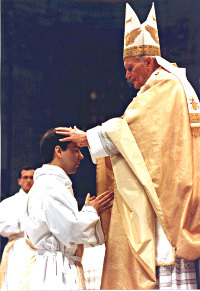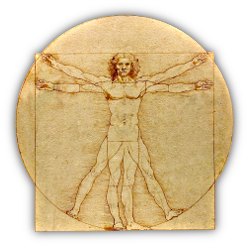
Sacraments are outward signs, instituted by Christ, that give sanctifying grace. They are a huge gift to the Church that build and sustain us. Some time ago, I discussed the basics. In understanding the sacraments, we also see that certain requirements must be met for validity. That is, to receive the intended graces, the sacrament must meet certain requirements.
Various causes may render a sacrament invalid such as some defect in the matter, form, minister or recipient. One very interesting requirement is intent. If the intent is absent then the sacrament is not received.
For example, if a priest were to demonstrate the sacrament of baptism for an RCIA class. He might pour water over an unbaptized person and say the trinitarian formula – “I baptize you in the name of the Father, and of the Son, and of the Holy Spirit.” Since his intent was to demonstrate the process and not actually baptize the person, the sacrament is not received and the person remains unbaptized.
Another example: an engaged couple is asked to recite their vows in Church the week before their wedding for a movie documentary. A participating priest expects the couple to receive the Sacrament of Matrimony the following week, but unbeknownst to him, they can not wait any longer. Before the ceremony the couple discuss their intent to marry then. Are they married? Probably! While a terrible idea, this appears to be valid because in the case of matrimony, the couple administer the sacrament – they marry each other. The priest or deacon only assist and act as a witness. If everything else is in order (per the Church, not the state), they would be married by their intent. Sure, this is an unlikely and contrived example, but illustrates the point!
This raises another good question, who exactly administers the sacraments? For the most part it is a priest acting in persona Christi (in the person of Christ). In other words, it is Christ himself administering the sacrament through the priest. When we receive the Sacrament of Reconciliation (i.e. “confession”) and the priest says “I absolve you from your sins” it is NOT the priest who is absolving your sins. He is not God. Rather, by virtue of Holy Orders it is Christ acting through the priest who absolves you.
Of the 7 sacraments, Confirmation, Eucharist, Reconciliation, and Anointing the Sick require a priest with faculties to administer. Only a bishop may administer Holy Orders (ordain a priest or, with the permission of the pope, another bishop).
Christ Himself created His Church and gave her authority. That authority has been passed by the Apostles, the initial recipients of this authority, in an unbroken chain to today’s bishops. We refer to this as Apostolic succession. Faculties are legal instruments under cannon law that grant permission to ordained priests to perform certain actions such as administering certain sacraments. Priests and deacons receive faculties from their bishop (and at his pleasure, may be removed).
There are only three levels of Holy Orders: deacon, priest and bishop. All bishops are first priests and all priests are first deacons. Faculties increase from one level to the next. Only bishops have full faculties, priests generally have the faculties of bishops except Holy Orders (ordination) and deacons generally have the faculties of priests outside of acting in persona Christi.
Deacons can hatch, match and dispatch (sometimes referred to as carried, married and buried). Those are not the formal terms, of course! Deacons can baptize, assist at / witness marriages and perform funerals. They are also ordinary ministers of Holy Communion and can preach the Gospel.
Baptizing, if done with intent in the proper form, can be done by anybody in extraordinary circumstances. That includes non-Catholics and even non-Christians. The Church therefore recognizes the baptisms of other Christian communities, properly performed. We see their baptism as sacramental, even if they do not. Although they are not in full communion with us, through their baptism they join us in the Communion of Saints, the Church Militant, the Body of Christ.
Likewise, when two baptized people validly (per the Church, not the state) marry each other, their marriage is sacramental. The Church also recognizes the validity of proper (per the Church, not the state) non-sacramental marriages (e.g. one or both parties are unbaptized). BTW, I stress “per the Church, not the state” because sadly, the state and secular society in general increasingly have little idea what marriage is.
The validity of marriage is a big topic that I will save for a future post.




















